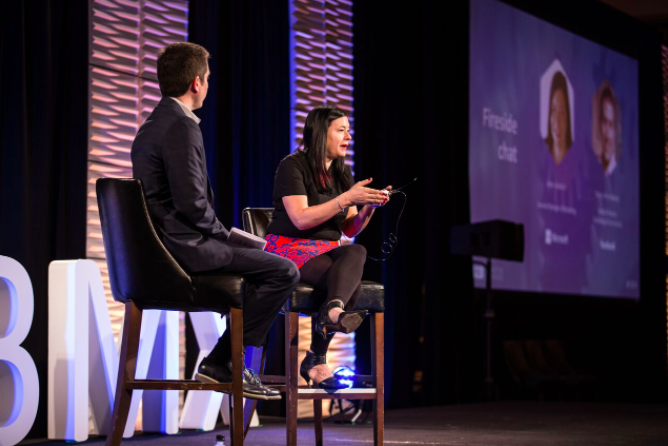Disruption Leads To Innovation: Reinventing Traditional Marketing For The Mobile Age
- Written by Brian Anderson
- Published in Industry Insights
At Demand Gen Report’s annual B2B Marketing Exchange, roughly 1,000 B2B marketing and sales professionals gathered to learn about the tech, strategies and trends disrupting the marketplace. As digital disruption from companies such as Uber and Tinder changes personal expectations for people outside of the office, decision makers within companies look for a similar streamlined customer experience that is becoming more and more available via the mobile device.
“Disruption is the key driver of innovation,” said Paul Peterman, Head of Technology and Connectivity at Facebook, during his session. “Disruption is doing new things that make the old things obsolete.”
Peterman noted that the biggest trend disrupting the B2B marketplace is the growing mindset of “mobile first” in the eyes of buyers. According to Peterman, Research shows that 84% of business decision makers said mobile is vital to their day-to-day life and business decisions.
This disruption was attributed to the growing role Millennials have within B2B companies. “Millennials are the new purchase influencers,” said Peterman. “Nearly half of all B2B researchers are millennials.”
Throughout the keynote, Peterman shared stats detailing the importance of mobile devices in the personal and professional lives of the Millennial generation. According to Peterman, research shows that:
- On average, business people check their phone 150 times per day;
- 84% of Millennials said mobile devices are vital to their work; and
- 62% said they are most likely to be loyal to a brand that interacts with them on social media platforms.
Peterman said that mobile devices are creating a unique opportunity to engage business decision makers in one of the few channels that cross over into their personal lives.
“The lines between personal and professional [lives] have blurred,” said Peterman. “Instead of work/life balance, there's a strong push for work/life integration.”
With growing tech trends and best practices skewing more towards the mobile age, Peterman concluded that it’s vital to reinvent traditional marketing practices throughout the path to purchase and across all business objectives to meet the expectations of these new decision makers.
“Ultimately, B2B companies must find and influence [decision makers] where they spend their time today,” said Peterman. “This is [achieved] when they can engage and share relevant content to influence positive experiences.”
Growing A Team In A Disruptive Environment

During his presentation, Peterman invited Ada Agrait, General Manager of Marketing at Microsoft, to the stage to discuss how she and her team are positioning themselves to successfully scale their efforts in a disruptive environment.
When asked what traits she looks for in a marketing professional, Agrait said that it is important to have “native digital marketeers” on your team that speak the same language as today’s digital-savvy, mobile-first business decision makers.
“They need to understand consumer behavior and have the measurement skills,” said Agrait. “They also need a desire to consume data and continuously learn. If we don't have people with an inner analyst, a lot of the work and measurement we do doesn't pay off.”
Along with the ability to adapt to new trends and have an always-on learning mentality, Agrait also said the marketers have to be willing and able to experiment to identify opportunities for success.
“Experimentation is key alongside creativity and communication,” said Agrait. “To be a good marketer, you need to be a good communicator. Also, people who are passionate about their work don't have to be pushed to go the extra mile.”
To fuel that transformation, Agrait noted that data and insights obtained from multichannel efforts are crucial to fueling that ongoing growth.
“I think data is at the heart of transformation,” said Agrait. “A lot of companies don't have visibility into multi-touch campaigns, so it’s important for us to continue to advocate piloting new tools that position us to innovate.”


